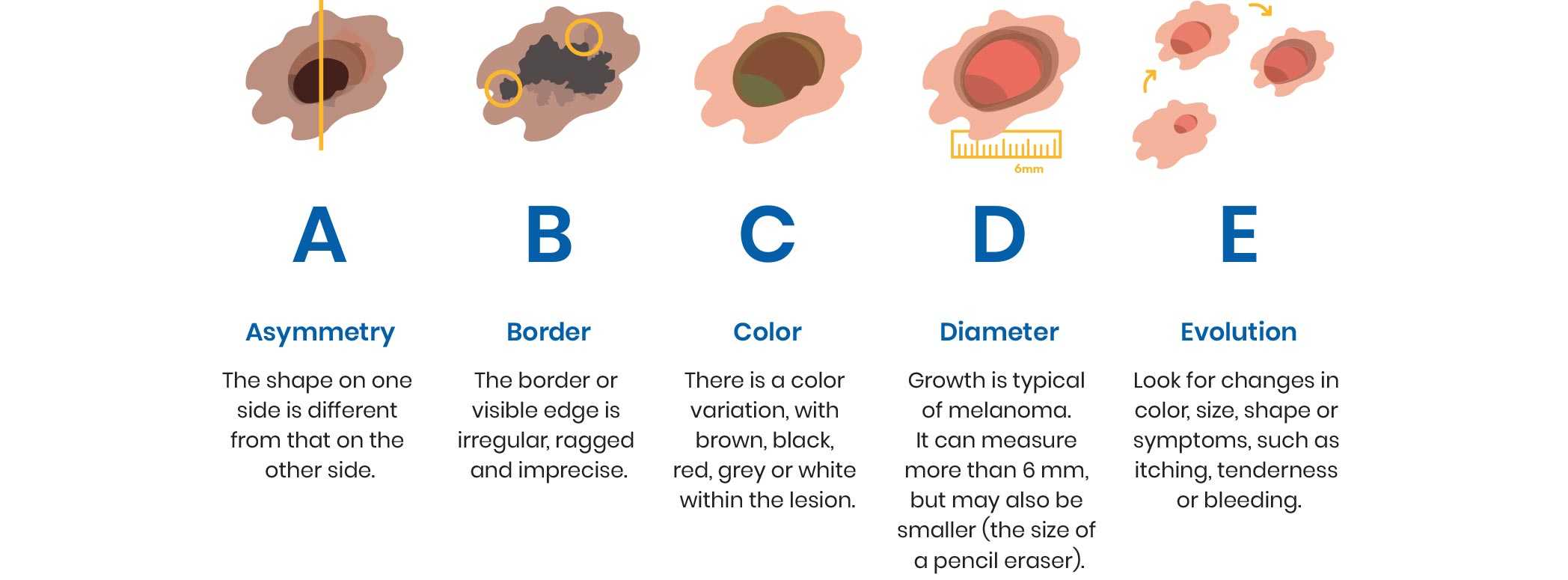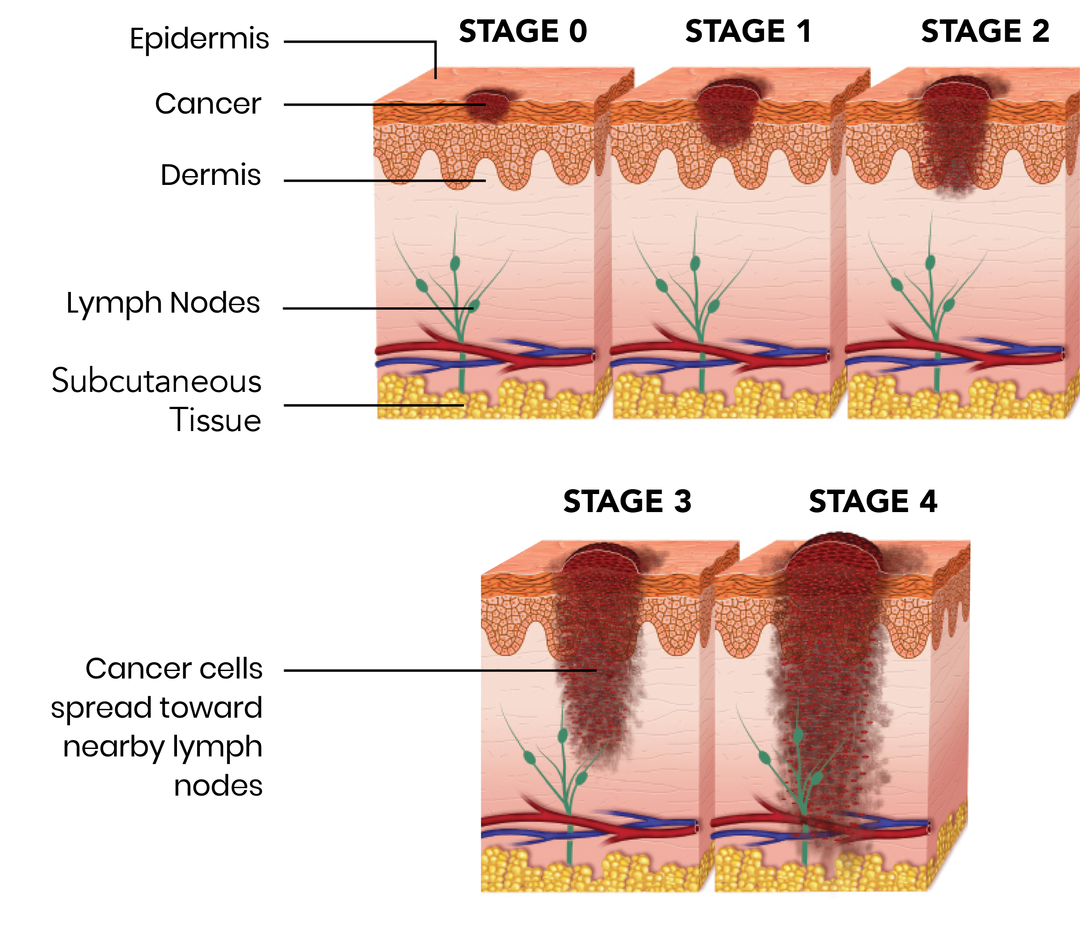Understanding Melanoma > What Is Melanoma?
What is Melanoma?
Melanoma is a type of skin cancer. Cancer is a disease that starts with cells that are damaged. The damaged cells grow out of control. Soon the damaged cells crowd out the healthy cells: there are too many damaged cells, and there isn’t enough room for healthy cells. This makes it hard for the body to work the way it should.1,2,3
Skin cancer happens in damaged cells in the outer layer of the skin (the epidermis). With melanoma, the damage is in cells called melanocytes, which give the skin its color.4 The damaged cells may lump together and form a tumor.3 Tumors that are cancer are called malignant.3 If the tumor is malignant, doctors group the cancer into stages based on5:
- How thick the tumor is
- Whether the tumor has ulcerated (broken through the skin)
- Whether the tumor has spread to nearby lymph nodes
- Whether the tumor has spread to distant lymph nodes or distant organs. Common areas are the lungs, liver, brain, bones, and the skin or lymph nodes in other parts of the body.
Symptoms of Melanoma
One of the first signs of melanoma is a change in the shape, color, size, or feel of an existing mole.6 However, melanoma may also take the shape of a new mole.6 In advanced melanoma, the skin on the mole may look scraped and feel hard or lumpy.6 It may also bleed or ooze pus. The melanoma can also itch, feel tender, or be painful.7
Melanomas can develop anywhere on the skin, but are more likely to appear on the chest and back in men and on the legs in women.1
One simple way to remember the warning signs of melanoma is to remember the ABCDEs of melanoma detection.6

Stages of Melanoma
There are 5 stages of melanoma6:
Stage 0: The tumor is only in the epidermis. It hasn’t spread deeper than the outer layer of the skin.6
Stage 1: The tumor is thicker than in Stage 0 melanoma. It may have grown past the epidermis and into the dermis.6
Stage 2: The tumor is thicker than in Stage 1 melanoma. It has grown past the epidermis.6
Stage 3: The cancer has spread to one or more lymph nodes. Lymph nodes are part of the body’s immune system, which helps the body fight disease and infection. There may also be ulceration—when the skin above the tumor breaks down.7,8,9
Stage 4: The cancer has spread from the skin to other parts of the body such as the lungs, liver, brain, and bones.10

When melanomas are first diagnosed, they are typically removed by a surgery called a biopsy. Sometimes an additional surgery may be needed to remove more tissue and confirm an initial diagnosis of melanoma. Then, to determine the stage of melanoma, additional surgery may be needed to biopsy or remove lymph nodes. If the melanoma has spread to one or more lymph nodes but can be surgically removed (resected) it is considered Stage 3. Sometimes, Stage 3 melanoma is unresectable. This means the cancer can't be removed by resection.4,11-13
Stage 4 is considered metastatic melanoma. That means the cancer has spread from the skin to other parts of the body such as the lungs, liver, brain, and bones.8,16
Both unresectable Stage 3 melanoma and Stage 4 melanoma are considered advanced melanoma.15
Download this guide to learn more about skin cancer.
Watch now to learn more about melanoma
Learn more about advanced (unresectable or metastatic melanoma) in this video.
Melanoma Patient Voices
Christine was surprised to find out her melanoma had returned after surgery.
Now, she talks about the importance of asking questions. Watch Christine's story.
Jackie was diagnosed with melanoma in her early 20s.
See how she encourages others to be their own healthcare advocate.
Where to next? Learn about biomarkers >
REFERENCES
- American Cancer Society. What is melanoma skin cancer? Cancer A-Z. https://www.cancer.org/cancer/melanoma-skin-cancer/about/what-is-melanoma.html.
- American Cancer Society. If you have melanoma skin cancer. Cancer A-Z. https://www.cancer.org/cancer/melanoma-skin-cancer/if-you-have-melanoma.html.
- National Cancer Institute. What is cancer? About Cancer. https://www.cancer.gov/about-cancer/understanding/what-is-cancer.
- National Cancer Institute. Melanoma Treatment (PDQ®)–Patient Version. Cancer Types. https://www.cancer.gov/types/skin/patient/melanoma-treatment-pdq#_176_toc.
- American Cancer Society. Melanoma skin cancer stages. Cancer A-Z. https://www.cancer.org/cancer/melanoma-skin-cancer/detection-diagnosis-staging/melanoma-skin-cancer-stages.html.
- American Society of Clinical Oncology. Melanoma: symptoms and signs. https://www.cancer.net/cancer-types/melanoma/symptoms-and-signs.
- American Cancer Society. Signs and symptoms of melanoma skin cancer. Symptoms of Melanoma. https://www.cancer.org/cancer/melanoma-skin-cancer/detection-diagnosis-staging/signs-and-symptoms.html.
- AIM at Melanoma Foundation. Stages of melanoma. Understanding Melanoma. https://www.aimatmelanoma.org/stages-of-melanoma/.
- AIM at Melanoma Foundation. Stage III melanoma. Understanding Melanoma. https://www.aimatmelanoma.org/stages-of-melanoma/stage-iii-melanoma/.
- National Cancer Institute. Lymph node. NCI Dictionary of Cancer Terms. https://www.cancer.gov/publications/dictionaries/cancer-terms/def/lymph-node.
- National Cancer Institute. Immune system. NCI Dictionary of Cancer Terms. https://www.cancer.gov/publications/dictionaries/cancer-terms/def/immune-system.
- AIM at Melanoma Foundation. Stage IV melanoma. Understanding Melanoma. https://www.aimatmelanoma.org/stages-of-melanoma/stage-iv-melanoma/.
- National Cancer Institute. Resection. NCI Dictionary of Cancer Terms. https://www.cancer.gov/publications/dictionaries/cancer-terms/def/resection.
- AIM at Melanoma Foundation. Options for stage III melanoma. Understanding Melanoma. https://www.aimatmelanoma.org/stages-of-melanoma/stage-iii-melanoma/treatment-options-for-stage-iii-melanoma/.
- National Cancer Institute. Unresectable. NCI Dictionary of Cancer Terms. https://www.cancer.gov/publications/dictionaries/cancer-terms/def/unresectable.
- National Cancer Institute. Metastatic. NCI Dictionary of Cancer Terms. https://www.cancer.gov/publications/dictionaries/cancer-terms/def/metastatic.
